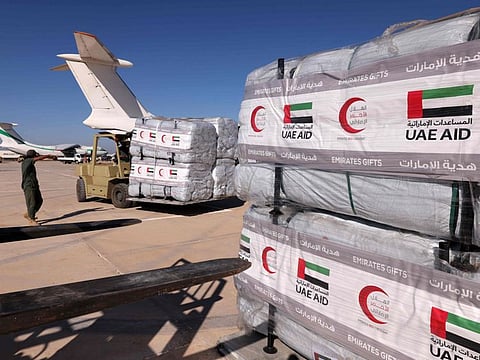Death toll from floods reaches 11,300 in Libya’s coastal city of Derna
A week on, bodies are still being found, some washing up on the sea shore

CAIRO: At least 11,300 people have died and another 10,100 are missing from the coastal city of Derna one week after Storm Daniel hit northeastern Libya, the UN Office for the Coordination of Humanitarian Affairs reported on Saturday.
An estimated 170 people have been killed as a result of the flooding elsewhere in the country, and more than 40,000 people have been displaced, the UN report said, citing the latest data from International Organizaton for Migration. Figures are expected to rise as search-and-rescue efforts continue to look for survivors.
Aid is now arriving in the North African country as the world mobilises to help emergency services cope with the aftermath of the deadly flood.
Two dams upstream from Derna burst a week ago under the pressure of torrential rains from the hurricane-strength Storm Daniel.
The dams had been built upriver from the port city of 100,000 people after it was hit by significant flooding in the mid-20th century.
The banks of a dried riverbed or wadi running through the city centre had been heavily built on, and last week’s torrent swept everything before it as it rushed towards the Mediterranean.
A week on, bodies are still being found, some washing up on the sea shore.
A rescue crew from Malta’s Civil Protection Department discovered a beach strewn with dead bodies on Friday, the Times of Malta newspaper reported.
International aid is arriving from the United Nations, Europe and the Middle East, offering some relief.
The aid includes water, food, tents, blankets, hygiene kits and medicines and emergency surgical supplies, as well as body bags and heavy machinery to help clear the debris.
In Al Bayda, 100 kilometres (60 miles) west of Derna, residents waded through the layer of mud caking the floors of what were once their homes.
Ayman Jabril Saleh, a resident of Al Bayda who survived the flood with his family inside their house, said “when we saw the state of Derna, we felt blessed” for suffering material losses only.
The damage for the devastating flooding brought by Storm Daniel was exacerbated by poor infrastructure in Libya.
Disease risk
With tens of thousands of people displaced, aid organisations have warned of the risks posed by leftover landmines and other unexploded ordnance that may have been shifted by floodwaters.
The risk of water-borne diseases such as cholera are also high, according to aid groups.
The National Centre for Disease Control reported that at least 55 children were poisoned by drinking polluted water in Derna.
But the eastern-based health minister insisted that samples were being analysed daily to avoid contamination, urging residents not to use groundwater.
Abdul jalil also denied reports of a possible evacuation of Derna, saying that only “certain areas” could be “isolated” to facilitate relief efforts.
To assist the hundreds of thousands in need, the UN has launched an appeal for more than $71 million.
The scale of the devastation has prompted shows of solidarity, as volunteers in Tripoli have collected aid for the flood victims.
Survivors in Derna are glad to be alive, even as they mourn the loss of loved ones.
“In this city, every single family has been affected,” said Derna resident Mohammad Al Dawali.
Seir Mohammad Seir, a member of the security forces, spoke of a three-month-old girl who lived through the tragedy in Derna.
“Her entire family died, she was the only one who survived.”
Sign up for the Daily Briefing
Get the latest news and updates straight to your inbox



